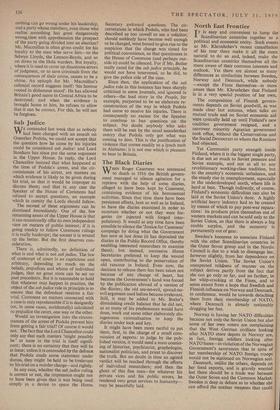Sub Judice
WE contended last week that as nobody had been charged with an assault on Guenther Podola, we could not accept that the question how he came by his injuries could be considered sub Judice: and Lord Stonham has since put the same argument in the Upper House. In reply, the Lord Chancellor insisted that what happened at the time of Podola's arrest, and the cir- cumstances of his arrest, are matters on which evidence is likely to be given during his trial, so that it would be improper to discuss them; and that in any case the Speaker of the House of Commons had refused to accept questions, an example which in comity the Lords should follow.
The second of these arguments can be dismissed immediately. One of the few remaining assets of the Upper House is that it can occasionally offer its own independent view on matters of public interest; if it is going meekly to follow Commons rulings it is really bankrupt; the sooner it is wound up the better. But the first deserves con- sideration.
There is, admittedly, no definition of what is and what is not sub judice. The law of contempt of court is so capricious and arbitrary, depending so much on the beliefs, prejudices and whims of individual judges, that no great store can be set on past precedents. But it is reasonable to hold that whatever may happen in practice, the object of the sub judice rule in principle is to ensure that the defendant receives a fair trial. Comment on matters connected with a case is only reprehensible if it is designedly (or, in some cases, accidentally) calculated to prejudice the court, one way or the other.
Would an investigation into the circum- stances of the arrest of Podola prevent him from getting a fair trial? Of course it would not. The fact that the Lord Chancellor could only say that such matters 'might possibly be' at issue in the trial is itself signifi- cant; there is no certainty that they will be at issue; unless it is contended by the defence that Podola made some statement under duress, they might be held to be irrelevant to his trial on a murder charge—and rightly.
In any case, whether the sub judice ruling is correct or not, the impression ought not to have been given that it was being used simply as a device to spare the Home Secretary awkward questions. The cir- cumstances in which Podola, who had been described as too unwell to see a solicitor, should suddenly have become well enough to be charged, were bound to give rise to the suspicion that the charge was timed for political convenience, so that questioners in the House of Commons (and perhaps out- side it) could be silenced. For if Mr. Butler really cared for the sub judice principle, he would not have intervened, as he did, to give the police side of the case.
Since then, the application of the sub judice rule in this instance has been sharply criticised in some journals, and ignored in others—the lead story in the People, for example, purported to be an elaborate re- construction of the way in which Podola had come to receive his injuries. There is consequently no excuse for the Speaker to continue to ban questions on the subject. No doubt anybody who asks them will be met by the usual neanderthal outcry that Podola only got what was coming to him. This is the justification of violence that comes readily to a lynch mob in Alabama: it is not one which is pleasant to hear in Britain.






























 Previous page
Previous page